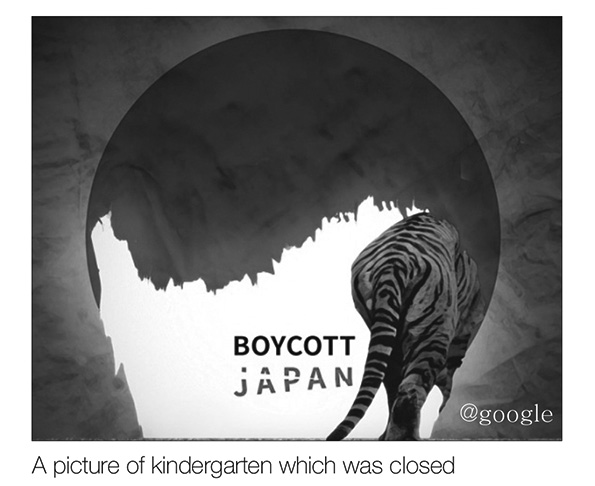
Last July 1st, Japan announced that it will regulate exports concerning 3 core materials of semiconductors and displays. It said that the reason is its loss of trust in South Korea. Japan has still not apologized for the forced labor and its military sexual slavery. Koreans who heard this news got angry and started to boycott Japan. Thus, the CBT researched the Japan Boycott and surveyed whether CBNU students know about these issues.
For Japanese industries, it will take considerable time to feel the aftermath of Koreans’ boycott, since it affects the sales performances of the companies. The tourism industry of Japan affected right away. According to a report by the Japan National Tourism Organization (JNTO), the biggest drop in Japanese tourism was from Korea. Also, Busan Port Authority reported that the passenger rate of traveling to Tsushima had decreased by almost 90%.
Seo Gyeong-deok, a public relations specialist who was interviewed by the Ulsan Journal, explained that in the past, boycotts were usually conducted by civic groups, but now, ordinary people are more voluntarily participating. It has become more meaningful. According to a report on changes in consumer purchasing patterns published by the Korea Broadcast Advertising Agency, boycotts are expected to continue for a while as more than 80.4% of the people are participating in boycotts. In particular, young people are actively involved.
CBT surveyed CBNU students about recognition of Japan Boycott from Aug. 9th to Aug. 15. In the result, 71% of students (57 people) have participated in the boycott and the other 29% (23 people) didn’t. Also, students who have participated in the boycott were asked about the reason for the boycott. The reason is that ‘Historical issues such as the Japanese colonial period’ were the highest at 70.2% (40 people) with ‘Measures to resolve economic retaliation measures in Japan.’ Following this, 33.3% (19 people) was the anti-Japanese sentiment caused by hatred of Korea in Japan and 17.5% (10 people) was the ‘Choice based on their political inclination.’
In terms of how they carried out the boycott, 86% (49 people) chose to boycott Japanese products, and 81% (46 people) chose to avoid travelling to Japan. 47.3% (27 people) of them chose not to enjoy Japan-related cultural life (books, movies, cartoons, etc.). Also, 45.6% (26 people) of them avoid using the Japanese language. The noticeable thing was that, in general, the boycott rate was high in many areas, but boycotting Japanese restaurants was overwhelmingly low with 22.8% (13 people). There was a question where students can rate the Japan boycott. The higher they score, the more they support the boycott. 9 people (15.8%) chose the highest score of 5 points, 29 students (50.9%) selected 4 points and 17 people (29.8%) selected three points. Only one student (1.8%) chose 1 point.
Students who haven’t participated in the boycott were asked why they haven’t done so. Most of the students replied, ‘Because of the concern of the financial loss in Korea.’ Also, ‘The difficulty to distinguish Japanese stuff’ accounted for 34% (8 people), ‘The antipathy caused by forced boycott of Japan’ accounted for 30.4% (7 people), ‘The choice according to one’s political orientation’ accounted for 13% (3 people), and the other opinions accounted for 34.8% (8 people). There was also a question where students can rate their opinion of Japan. The higher they score, the more they like Japan. Two people (8.7%) selected 4 points. Fourteen people (60.9%) selected three points, and 10 people (43.5%) selected two points. 7 people (30.4%) selected one point, and only 4 people (17.4%) selected five points. The survey asked them what they think about people who do boycott. ‘It doesn’t matter, so I don’t care’ accounted for 87% (20 people), and ‘I don’t like the active boycott’ accounted for 34.8% (8 people). The other opinions were, ‘It seems to be an emotional response.’ and ‘It’s a stupid fight between 2 countries.’ Through this survey, it seems that political orientation does not affect the boycott.
First of all, CBT expresses its thanks to the CBNU students for taking part in the survey. The sample size was too small to represent all CBNU students, but it can be expected that people can have various opinions. It turned out that many CBNU students also supported the boycott along with the overall national movement. As a result, however, it seems that people who are in favor of or against the boycott of Japan are doing so for the sake of Korea. This will pave the way for us to get through this difficult situation.
By Jung Jin-ju
asd030@cbnu.ac.kr


 All
All Society & Global
Society & Global






 Jung Jin-ju
Jung Jin-ju











